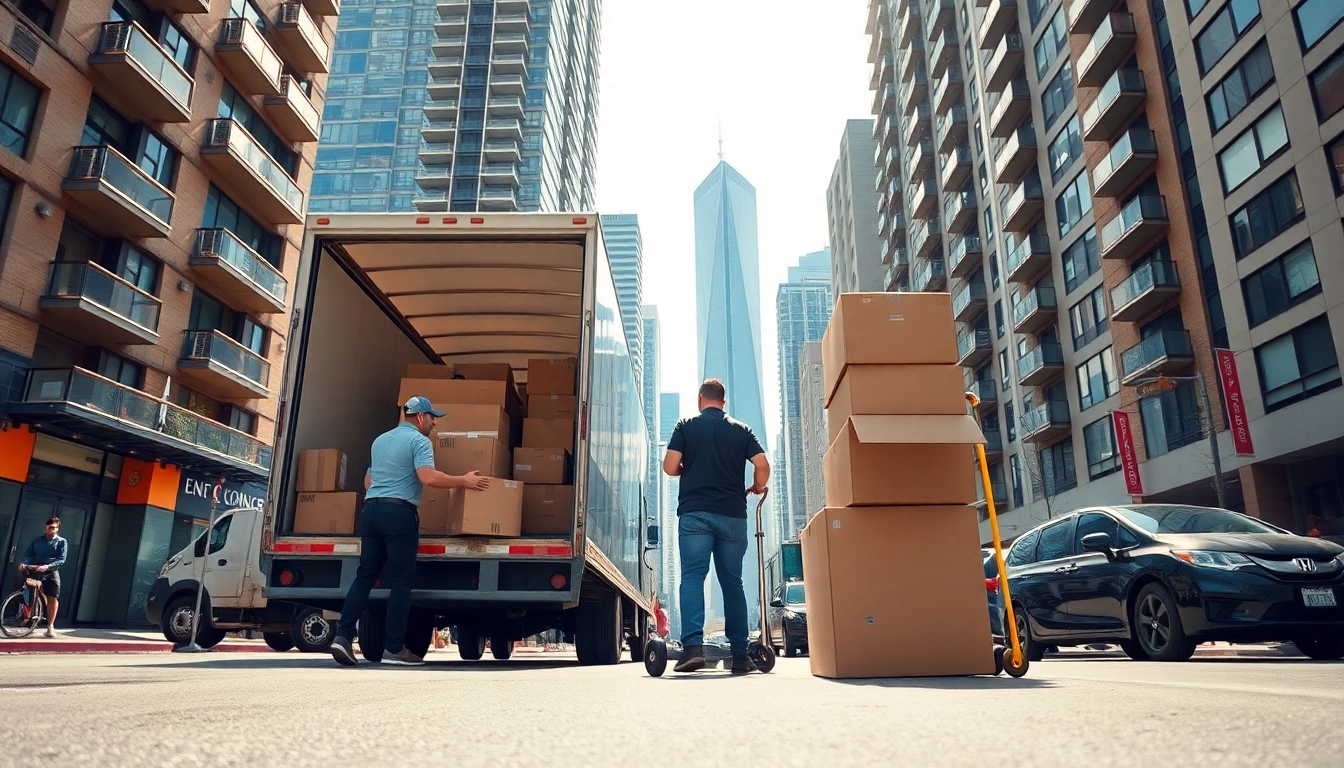Understanding the Moving Process with Movers in Toronto
Moving can be a complex and demanding process, whether you’re relocating a household or a business in Toronto. Understanding the stages involved, paired with the expertise of movers in Toronto, can significantly enhance your experience. Below, we delve into the key steps that outline how moving effectively unfolds, ensuring minimal stress and maximum efficiency.
1.1 Initial Consultation and Estimation
The first step in the moving process typically starts with an initial consultation. During this stage, potential movers will often provide an estimate based on the volume of goods to be moved. A thorough assessment is essential, as it helps both parties identify the scope of the project. Here are several aspects that are generally covered:
- Assessment of the items being moved.
- Discussion of special requests, such as moving oversized furniture or fragile items.
- Understanding any time constraints or specific moving dates.
This consultation also offers customers a chance to get a feel for the moving company, check for professionalism, and clarify questions about logistics.
1.2 Planning Your Move
Once the initial estimates are in, the next critical phase is planning your move. This involves coordinating the timing and logistics to ensure a seamless moving day. A good moving service will help with:
- Creating a detailed moving schedule.
- Organizing necessary permits for loading and unloading.
- Arranging for utilities to be disconnected and reconnected at the new address.
A clear plan minimizes the risk of overlooking vital details and helps keep everything on track as moving day approaches.
1.3 Communication and Coordination
Effective communication is paramount for a successful move. After you have chosen your movers, ongoing coordination ensures everything runs smoothly. This can include:
- Regular updates from your moving team about logistics.
- Coordination with other service providers (e.g., painters or cleaners).
- Addressing last-minute concerns or changes.
An open line of communication not only fosters trust but also allows for a proactive approach to any challenges that may arise.
Factors to Consider When Hiring Movers in Toronto
Choosing the right moving company is crucial. It involves various factors beyond mere pricing. Here, we explore some essential considerations when selecting movers in Toronto.
2.1 Licensing and Insurance
One of the most critical factors when hiring movers is to ensure they have the proper licensing and insurance. In Canada, moving companies must have licenses to operate in various provinces and territories. Insurance protects both the mover and the client against potential damages during the moving process. Verify the following:
- Check if the company is licensed by the provincial government.
- Inquire about their insurance coverage—do they have liability insurance?
- Understand what their insurance policy covers in case of loss or damage.
2.2 Experience and Specializations
Experience matters. Research each company’s history and their area of expertise. Some movers may specialize in residential moving, while others may focus on commercial or specialty goods. Consider these points:
- Years of experience in the moving industry.
- Specific types of moves they handle (e.g., local, long-distance, or interstate).
- Reviews and testimonials from past customers can offer insight into their service quality.
2.3 Pricing and Transparency
Pricing can significantly vary among moving companies. It’s essential to obtain written estimates and understand the pricing structure. Ensure transparency by checking:
- If the estimate is binding or non-binding.
- Additional costs for services like packing, storage, or moving specialty items.
- Any extra fees on moving day (e.g., for stairs or elevators).
Clear communication about pricing helps avoid surprises as your moving date approaches.
Preparing For Your Move with Movers in Toronto
Preparation is the key to a hassle-free moving experience. Properly preparing for your move not only ensures that everything runs smoothly on the big day, but also reduces the stress associated with relocating. Below are actionable tips to help you get ready.
3.1 Packing Tips and Best Practices
Packing correctly is one of the crucial aspects of moving. Improper packing can lead to breakages and damages. Here are some best packing practices:
- Use quality packing materials—sturdy boxes, bubble wrap, and packing tape.
- Label each box clearly, indicating not just contents but where they belong in the new space.
- Pack room by room to stay organized. This reduces the risk of losing items and also simplifies unpacking.
3.2 Organizing Your Belongings
Before you start packing, it’s wise to organize your belongings. This ensures you only move what is necessary. Consider these steps:
- Declutter by sorting items into categories: keep, donate, or dispose of.
- Consider holding a garage sale for items you no longer use.
- Organize important documents together, making them easily accessible during the move.
An organized process simplifies both your packing and your new living setup.
3.3 Handling Fragile Items
Fragile items require special handling during a move. Here’s how to ensure they arrive safely:
- Wrap fragile items individually in bubble wrap or newspapers.
- Use strong, reinforced boxes to minimize the risk of breakage.
- Clearly label boxes containing fragile items to inform movers to handle them with care.
By taking these precautions, you can significantly reduce the risk of accidental damage to valuable possessions.
What to Expect During the Moving Day
Moving day is the culmination of all your preparations. Knowing what to expect can ease anxiety and help everything run smoothly. Here’s a guide to what generally happens on moving day.
4.1 Arrival and Setup
On the day of the move, your moving team will arrive at the scheduled time. Here’s what you should anticipate:
- The team will introduce themselves and conduct a preliminary walkthrough of your premises.
- They will assess any last-minute details and confirm the plan for the day.
- Ensure that their setup includes a checklist of items to be moved.
This initial meeting helps clarify any last-minute details and ensures everyone is on the same page.
4.2 Loading and Transportation
Loading involves a systematic process to ensure efficiency and safety for your belongings:
- The team will start with larger items to maximize space in the truck.
- They will secure items properly to prevent movement and damage during transport.
- Route plans should be discussed, especially if using multiple vehicles for larger moves.
Transportation should be seamless with professional movers in charge, allowing you to focus on other aspects of settling into your new space.
4.3 Unloading and Final Setup
Upon arrival at your new location, the unloading process begins. This is often where the most care is taken:
- The team will unload items following the labeled boxes, making the unpacking process easier for you.
- Check off items on your list as they are brought in to ensure nothing is missing.
- Requests for specific placement in your new space should be communicated clearly.
A smooth unloading process ensures that you can start settling into your new space with minimal hassle.
Post-Moving Tips for Settling In
Once you’re in your new location, there are a variety of steps to help you settle in efficiently. Here’s how to make your transition smoother.
5.1 Unpacking and Organizing Your New Space
Unpacking can feel overwhelming, but a methodical approach can ease the process:
- Prioritize unpacking essential items first—clothes, toiletries, and kitchenware.
- Set up each room gradually rather than trying to do everything all at once.
- Use your labeled boxes to guide where items should go for better organization.
Taking this structured approach allows for a more manageable transition into day-to-day life in your new home.
5.2 Address Changes and Utilities
One common task after a move is to ensure that all your personal information is updated:
- Notify important contacts—including banks, subscription services, and government offices—about your address change.
- Set up utilities like gas, electricity, water, and internet in your new home.
- Consider changing your address for any mail deliveries and services.
A timely address update helps ensure that you remain connected and have access to your services right away.
5.3 Feedback and Reviews
After your moving experience, providing feedback to your moving company can help others in their selection process:
- Share your experiences on social media or review platforms.
- Highlight the strengths of the service and any areas for improvement.
- Your input can assist future customers in making informed decisions.
Feedback not only contributes to a moving company’s growth but also helps to create a better experience for the next customer.



